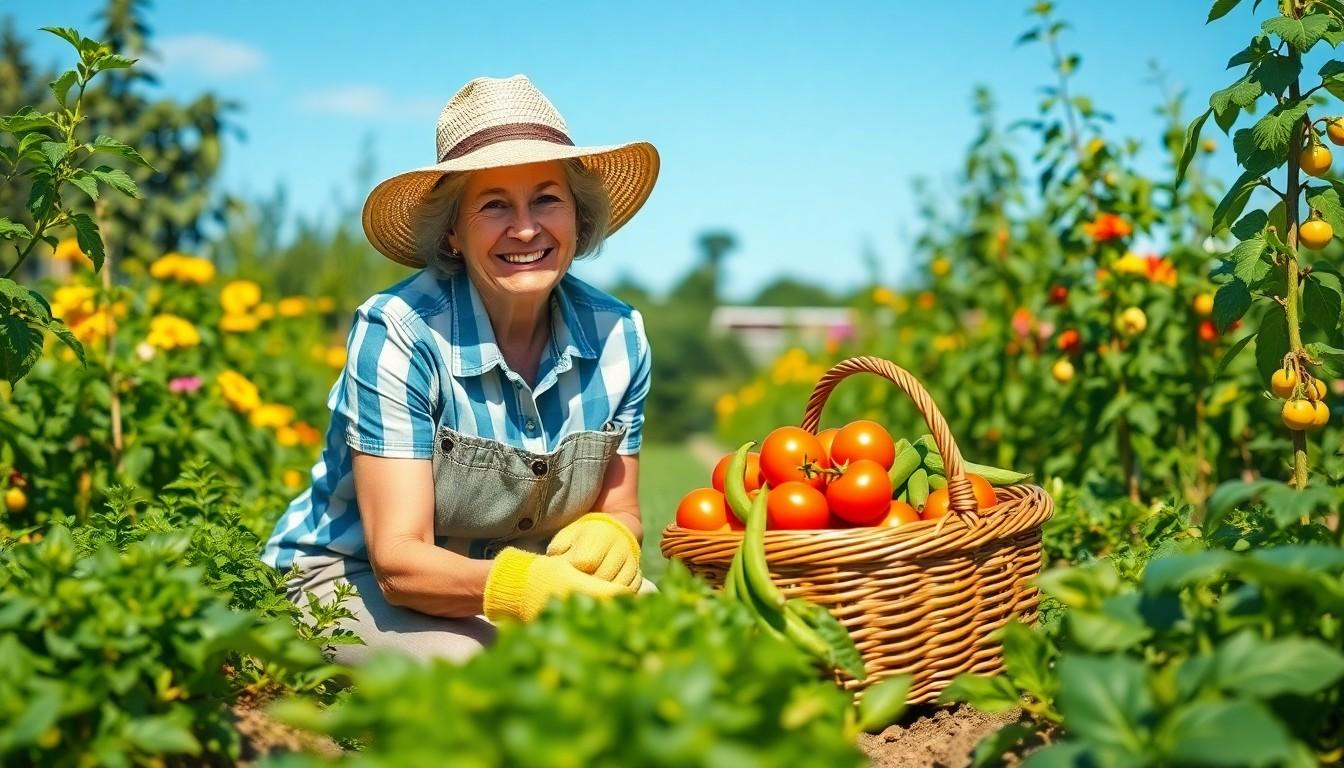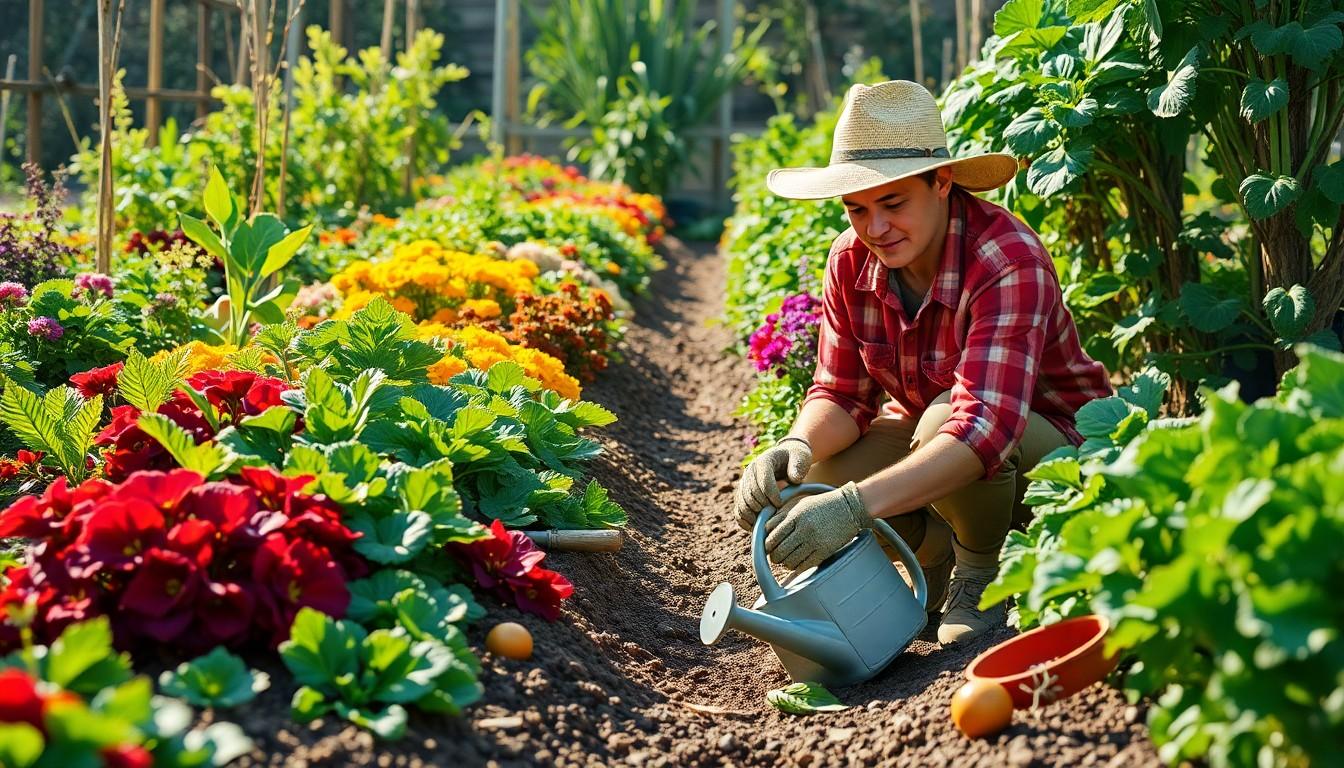Phone:
(701)814-6992
Physical address:
6296 Donnelly Plaza
Ratkeville, Bahamas.

Imagine stepping into your backyard and plucking fresh tomatoes or crisp lettuce right off the vine. Sustainable vegetable gardening isn’t just a trendy buzzword; it’s a ticket to fresher meals and a healthier planet. With a little know-how and some dirt under your nails, anyone can transform a patch of earth into a green haven that not only feeds the family but also helps save the world—one carrot at a time.
Sustainable vegetable gardening focuses on practices that promote environmental health while providing fresh produce. Engaging in this gardening method makes it possible to cultivate crops with minimal negative impact on ecosystems.
Sustainable vegetable gardening refers to growing food in a way that maintains soil health, conserves water, and minimizes chemical inputs. Practices include crop rotation, composting, and using organic pest control. These principles aim to create a balanced ecosystem where plants, soil, and beneficial organisms thrive together. Choosing native plants enhances biodiversity and reduces dependence on irrigation and fertilizers.
Sustainability in gardening plays a critical role in addressing food security. It provides fresh produce while reducing carbon footprints linked to industrial agriculture. Minimizing chemical use protects ecosystems and promotes overall health. Additionally, nurturing local produce supports community resilience by reducing transportation waste and fostering local economies. Emphasizing sustainable practices can significantly alleviate environmental challenges facing modern society.

Planning a sustainable garden involves strategic decisions that optimize space and resources. It’s essential to create an environment that nurtures plants while protecting local ecosystems.
Selecting the right location for a sustainable vegetable garden impacts growth and yields. Builders of these gardens should evaluate sunlight exposure; most vegetables thrive with six to eight hours of sunlight daily. Drainage plays a critical role, as standing water can harm plants. Additionally, proximity to water sources simplifies irrigation efforts. Vegetation barriers, like trees and shrubs, can protect against wind but should not cast excessive shade. Conducting soil tests before planting helps determine the nutrient levels present, allowing for appropriate amendments.
Choosing vegetables that align with sustainable practices enhances garden productivity and environmental health. Opt for native or hardy varieties that withstand local conditions and require less water. Seasonality influences selection, ensuring crops suit the current climate. Diversity within the garden helps deter pests naturally while promoting soil health. Grow perennial vegetables like asparagus or rhubarb; they require fewer resources over time. Utilizing heirloom seeds encourages biodiversity and preserves local strains. Prioritize crops that contribute to soil health by fixing nitrogen, such as beans or peas. This thoughtful selection lays a solid foundation for sustainable gardening success.
Soil health plays a crucial role in sustainable vegetable gardening. Healthy soil fosters robust plant growth, enhances nutrient delivery, and supports beneficial microorganisms essential for a thriving garden ecosystem.
Healthy soil offers numerous benefits for vegetable gardens. It serves as a foundation for nutrient-rich crops. Nutrients in the soil, such as nitrogen, phosphorus, and potassium, promote vigorous plant growth. Additionally, healthy soil improves water retention, minimizing irrigation needs. Organic matter in the soil supports biodiversity, fostering beneficial organisms like earthworms and beneficial bacteria. These organisms enhance soil structure and fertility, further contributing to a productive garden.
Several techniques enhance soil quality, promoting sustainability. Composting adds organic material, improving soil structure while providing essential nutrients. Mulching reduces evaporation and suppresses weeds, which contributes to moisture retention. Crop rotation prevents soil nutrient depletion by alternating plant families each season. Cover cropping protects and enriches the soil during off-seasons while preventing erosion. Incorporating sustainable practices ensures healthier, more productive soil, ultimately leading to a successful vegetable garden.
Water conservation is essential for sustainable vegetable gardening. By implementing effective methods, gardeners can minimize water use while maximizing plant health.
Drip irrigation systems deliver water directly to plant roots, reducing evaporation and runoff. Soaker hoses provide a similar benefit by releasing moisture slowly into the soil. Hand watering allows for precision, ensuring plants receive the right amount of water. Watering during early morning or late evening minimizes losses due to evaporation. Mulching around plants retains soil moisture and suppresses weeds, enhancing overall water efficiency. Choosing drought-resistant vegetable varieties further supports water conservation efforts.
Rain barrels capture runoff from roofs, providing a sustainable water source for gardens. This practice reduces reliance on municipal water supplies while utilizing natural resources. By installing gutters and downspouts, gardeners can direct rainwater to storage barrels. Overflow systems can be implemented to prevent flooding and manage excess water. Additionally, using harvested rainwater for irrigation builds resilience against dry spells and contributes to sustainable practices. Implementing these systems promotes environmental stewardship and reduces watering costs.
Effective pest and disease management is essential in sustainable vegetable gardening. Implementing natural strategies enhances plant health without harming the environment.
Utilizing beneficial insects, such as ladybugs and lacewings, supports natural pest control. Introducing these insects can significantly reduce aphid populations and other harmful pests. Neem oil serves as a natural pesticide that disrupts the life cycle of pests while being safe for beneficial organisms. Garlic and hot pepper sprays can deter many insects when applied regularly. Crop rotation prevents the buildup of specific pests and pathogens in the soil. Additionally, maintaining plant diversity attracts predatory insects that keep pest numbers in check.
Companion planting fosters mutual benefits among plants. Basil, for example, enhances the flavor of tomatoes while repelling mosquitos and flies. Marigolds deter nematodes and other harmful insects, providing protection to neighboring crops. Planting garlic near roses can minimize aphid infestations. Specific combinations, like carrots and onions, improve growth and deter pests through natural smells. Gardeners can increase yields and improve disease resistance through careful pairing.
Harvesting and maintaining a sustainable vegetable garden requires care and attention. Knowing when and how to harvest ensures optimal flavor and nutrition.
Timing is crucial when harvesting. Most vegetables achieve peak flavor when picked early in the morning. Use sharp, clean tools to avoid damaging plants. Remove vegetables gently to prevent injury to surrounding plants. Roots like carrots and beets require careful extraction to maintain their shape. Store harvested produce in a cool, dark place to prolong freshness. Inspect crops regularly, as timely harvesting encourages further production. Revisit areas already harvested, as many plants continue producing for several cycles.
Seasonal changes impact garden maintenance significantly. During spring, focus on soil amendments and planting schedules. Summer necessitates regular watering, mulching, and pest inspections. Observe crops closely for signs of stress or disease. In fall, plan for crop rotation and prepare beds for winter. Collect and compost spent plants to enhance soil nutrients. Winter maintenance includes protecting perennial crops and planning for upcoming seasons. This proactive approach keeps a garden thriving year-round.
Embracing sustainable vegetable gardening is a rewarding journey that benefits both individuals and the planet. By implementing eco-friendly practices and focusing on soil health water conservation and natural pest management gardeners can create thriving ecosystems right in their backyards. This approach not only yields fresh produce but also fosters a sense of community resilience and environmental stewardship.
As gardeners cultivate their plots with care they contribute to a healthier food system while enjoying the numerous advantages of homegrown vegetables. With a little effort and knowledge anyone can transform their gardening experience into a sustainable endeavor that supports personal well-being and the health of the Earth.